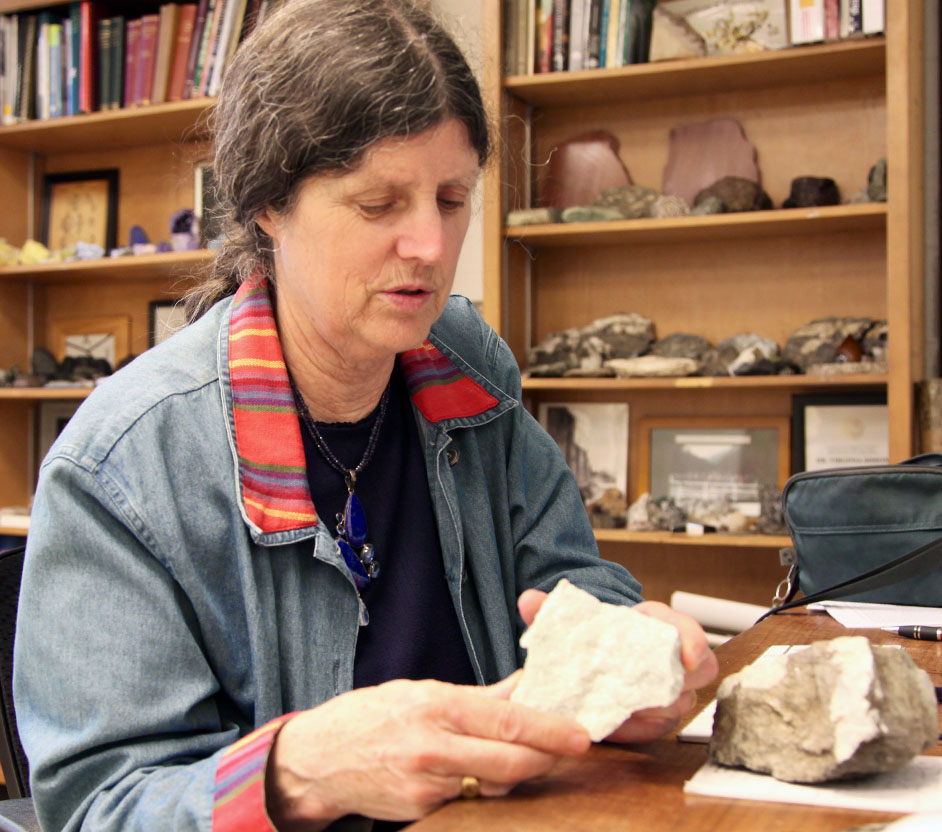Geologist Virginia Sisson Earns AAPG’s Grover E. Murray Memorial Distinguished Educator Award
Recognized for Personalized Approach to Learning In and Out of the Classroom
Virginia Sisson, instructional professor of geology at UH, earned the Grover E. Murray Memorial Distinguished Educator Award from the American Association of Petroleum Geologists (AAPG).
 The award, funded by the AAPG Foundation Awards Fund through a generous contribution by Dr. and Mrs. Grover Murray, is given to only two recipients from a nationwide pool of contenders each year.
The award, funded by the AAPG Foundation Awards Fund through a generous contribution by Dr. and Mrs. Grover Murray, is given to only two recipients from a nationwide pool of contenders each year.
Striving for Innovation in Education
Sisson, the director of summer field geology and co-director of the Geosciences Learning Center at the UH Department of Earth and Atmospheric Sciences, doesn’t believe in the status quo when it comes to teaching.
“I want my students to think beyond multiple choice questions,” she said. “My students write four essays per semester.”
She also shines when it comes to connecting public policy with geology. “During a presidential election year, I have my students write an essay about what science and geology issues they would tell the president as a scientific advisor and what the president’s opinions would be,” Sisson said.
Field Teaching Component of Learning
Due to the large number of students in her classes, Sisson creates her own virtual field trips that have no limit when it comes to capacity or time.
“By taking students on virtual field trips, students actually think and do exercises about the rocks,” she said. “The trips have doubled the number of students who can participate and get experience looking at rocks.”
Of her three virtual trips, one uses technology that stitches together hundreds of images to allow students to zoom into rocks to view details. Another takes students to Galveston to see geological features using technology that incorporates 360-degree photos of the landscape. A third includes UH campus tours to examine the types of stones used on buildings.
A fourth field trip under development will involve a gaming format and will take students to New Mexico to explore the terrain.
Students as Citizen Scientists
“I want my students to be citizen scientists,” said Sisson. “One of my teaching goals is to make students see how they use science in everyday life.”
One way Sisson does this is by having students collect soil samples around Houston to help create a soil map.
“If a house is built on the wrong type of soil, most likely the homeowner will have to foot the bill for a foundation repair,” said Sisson. “Knowing soil types can help my students be smarter home buyers down the road.”
Promoting Geology Education through Field Camps
Sisson also takes pride in her approach to learning outside the classroom. She serves as secretary of the Yellowstone Bighorn Research Association, a leader in earth science field education founded in 1936 by Princeton geologists.
“The Yellowstone Bighorn Research Association is where we go to conduct our field camp,” said Sisson, who has taught at the site in Red Lodge, Montana, for 30 years. She has helped organize the UH field camp for the past 15 years. The camp is nationally recognized by the Geological Society of America.
The geology field camp program helps students learn how to identify geologic problems and address them in the field, enhance field measurement and mapping skills, and grow technical skills by focusing on field problems related to different rock types. The camp consists of two courses, which are a degree requirement for UH undergraduates majoring in geology.
Chris Guillory, College of Natural Sciences and Mathematics

